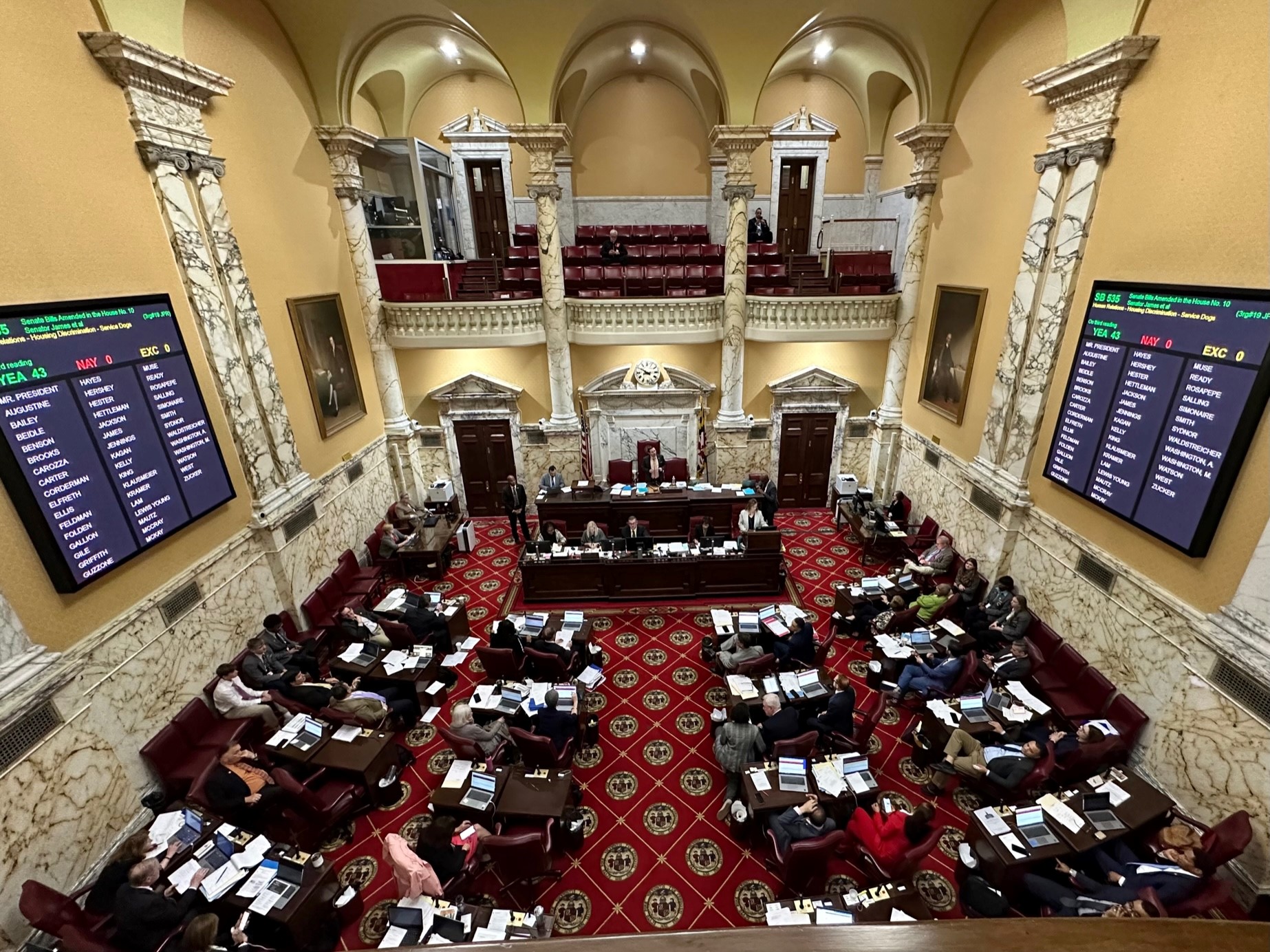Five years later, anti-sexual harassment reforms in legislature having desired effect

A state senator who spearheaded efforts to end sexual harassment in the halls of the Annapolis legislative campus says reforms passed five years ago coupled with other factors are changing a toxic culture that permeated the state capitol.
Sen. Ariana B. Kelly (D-Montgomery), then a delegate, led the 2018 charge on legislation to reform how the General Assembly treats sexual harassment. She and others say the reforms coupled with generational change in the General Assembly have impacted the culture that once tolerated sexual harassment.

Sen. Ariana B. Kelly (D-Montgomery). Photo by Bryan P. Sears.
“I don’t think that this bill alone is to credit for that,” said Kelly, who became a senator last year. “It’s myriad factors, including social changes during that time. Also, just the changes we’ve seen in the legislature and who’s in power. I think that the training has had a positive impact. I think people are conscious and aware. I have personally heard significantly fewer complaints from staff and interns which warms my heart.”
The often-painful discussion that led to change in Maryland in 2018 paralleled those happening around the country as the Me Too movement took center stage.
Kelly said she believes “the legislature really had an awakening” that year.
“It’s an extremely painful part of the legislative past for me,” said Kelly. “That being said, I’m overjoyed when I think of the present. I see such tremendous progress.”
The law that passed in 2018 broadened protections for women working in Annapolis, established an independent investigator to review complaints, made it illegal to retaliate against those who make complaints and required lawmakers to attend sexual harassment training every two years.
Failing to complete the training can result in, at a minimum, a public shaming of sorts.
Five lawmakers have yet to take the training so far this legislative term, according to a list on the General Assembly’s website — which is hard to find.
Lori Mathis, director of the Office of Operations and Support Services, which includes human resources for the Maryland General Assembly, said she believes the increased training and attention to workplace harassment is bearing results.
“From my perspective as HR manager for many years, I believe the consistent and repeated message that sexual harassment is a violation of MGA policy, together with the renewed commitment to the legislative community that we will take complaints seriously no matter who the alleged harasser is has made a significant difference,” Mathis said.
In an annual report released by Mathis in 2018, there were 17 incidents, some from prior years, involving legislators. Of those, 11 were sexual harassment complaints. It is not clear how many lawmakers were involved, and some could have had more than one complaint against them.
A year later, four complaints were lodged against legislators. Two more involved “a non-employee.”
In 2020, there was one complaint against a lawmaker resulting in no finding. Another was made against an employee of the General Assembly. That complaint was referred for criminal investigation.
There were no complaints in 2021 and 2022, years that also saw reduced in-person attendance in Annapolis due to the ongoing COVID-19 pandemic.
In 2023, there were four complaints.
One of those complaints, against a legislator, was dismissed. Another claim involving two legislative employees was “handled administratively.” Two other complaints made by employees in the Department of Legislative Services were investigated and dismissed, according to Mathis.
There has also been much change in the legislative chambers over the past few years. House Speaker Adrienne A. Jones (D-Baltimore County) became the first woman and first African-American to lead her chamber.
Leadership in the Senate changed over, too. The chamber got younger, and women hold more seats — nearly one-third of the Senate now — than in 2018.
The 2018 law requires all 188 lawmakers to complete the training every two years.
As part of the law, the General Assembly publishes a list of which lawmakers completed or did not complete the required training.
The public shaming of sorts is the first line of ensuring compliance. The list, however, can be difficult to find on the legislature’s website.
The training was offered nine times between Sept. 14, 2023 and Jan. 26 of this year through the legislature’s human resources department. Lawmakers received notice of the sessions a month in advance. All the training was offered virtually, according to Mathis.
“Human Resources is scheduling another group session for legislators who were not able to previously attend,” she said.
This year, five lawmakers out of 188 made the list of those who had yet to complete the training: two Democrats, both women, and three men, all Republicans.
“That’s really good compliance,” said Kelly. “Sometimes education really is the answer.”
In the House, Dels. Terry L. Baker (R-Allegany and Washington) and Barrie S. Ciliberti (R-Frederick) and Kriselda Valderrama (D-Prince George’s) — failed to complete the training.
Valderama, a five-term delegate and deputy majority leader, is a past sponsor of reforms to sexual harassment laws.
“I had a family personal matter going on, that popped up at the same time,” said Valderrama, who added that she planned to complete the training.
Attempts to reach Baker and Ciliberti were unsuccessful.
In a statement, Jones said the focus “is on getting the last few members to complete the legislature’s harassment training. Our expectation is that will happen and if not, we will determine appropriate consequences for noncompliance.”

Sen. Mary-Dulany James (D-Harford). Photo by Bryan P. Sears.
In the Senate, Sens. William G. Folden (R-Frederick) and Mary-Dulany James (D-Harford and Cecil) did not complete the training.
James, the former four-term delegate who was elected to the Senate in 2022 after an eight-year hiatus from the legislature, cited repeated scheduling conflicts.
“It kept conflicting with my other obligations,” said James. “I take this seriously.”
James added that make-up training was scheduled without consulting her office.
“They kept scheduling it when I have floor session or voting or other obligations,” she said.
Folden, a police officer in Frederick County, was elected to the Senate in 2022. He served one term in the House and voted for the 2018 law.

Sen. William G. Folden (R-Frederick). Photo by Bryan P. Sears.
“I had a scheduling conflict,” Folden said. “I was doing my regular job.”
Both said they planned to complete the training.
Failure to take the training can result in a range of responses from counseling from the presiding officer to loss of some privileges, namely interns and paid staff.
“I think we are going to offer the training one additional time and then if there is not an uptake, then there are certain privileges in the office that are not permitted,” said Senate President Bill Ferguson (D-Baltimore City).
“My hope is that it doesn’t get to that point,” Ferguson said. “Hopefully posting the list is enough to encourage everyone to take the training.”




 Creative Commons Attribution
Creative Commons Attribution